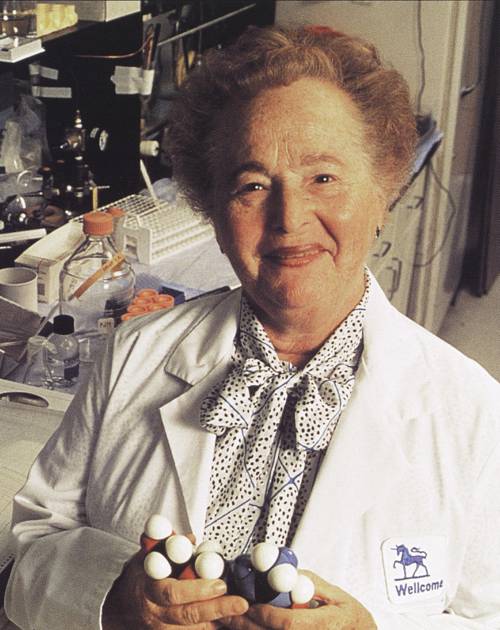
FAQ About Gertrude Elion

Who was Gertrude Elion?
Gertrude Elion was an American pharmacologist and biochemist who was renowned for her groundbreaking work in the development of drugs, particularly those that targeted various diseases, among them cancer and viral infections like AIDS. She shared the Nobel Prize in Physiology or Medicine in 1988 with George H. Hitchings and Sir James Black for their discoveries of important principles for drug treatment.

What is Gertrude Elion best known for?
Gertrude Elion is best known for her innovative drug discoveries, particularly the antiviral drug AZT, which is used to treat HIV/AIDS, as well as other vital medications such as mercaptopurine and allopurinol.

When did Gertrude Elion win the Nobel Prize?
Gertrude Elion won the Nobel Prize in Physiology or Medicine in 1988, alongside George H. Hitchings and Sir James Black, for their development of principles for drug treatment.

What significant drugs did Gertrude Elion help develop?
Gertrude Elion helped develop several groundbreaking drugs, including azidothymidine (AZT) for HIV/AIDS, mercaptopurine for leukemia, and allopurinol for gout. Her work has been essential in treating numerous diseases and conditions.

What was innovative about Gertrude Elion's approach to pharmacology?
Gertrude Elion's approach was innovative because she focused on understanding the biochemistry of diseases to develop drugs that would specifically target disease-causing processes. This led to more effective and targeted treatments, a method that became the basis for rational drug design.

What is AZT and why is it important?
AZT, or azidothymidine, is an antiretroviral medication used to prevent and treat HIV/AIDS. It was one of the first drugs available for this disease and marked a significant breakthrough in extending and improving the lives of those living with HIV.

What challenges did Gertrude Elion face in her career?
Gertrude Elion faced several challenges, including gender discrimination in the scientific field. Despite her academic excellence, she initially struggled to find positions due to being a woman. However, her determination and innovative research eventually earned her widespread recognition and success.

Where did Gertrude Elion work during her career?
Gertrude Elion spent most of her career at Burroughs Wellcome & Company (now part of GlaxoSmithKline), where she worked alongside George H. Hitchings to develop numerous drugs. She was instrumental in transforming the company's research division with her pioneering work.

How did Gertrude Elion's work impact medicine?
Gertrude Elion's work had a profound impact on medicine by introducing new ways to develop drugs that specifically target the underlying mechanisms of diseases. Her drug developments have saved countless lives and continue to be foundational in treatments for various conditions.

What is mercaptopurine, and why is it significant?
Mercaptopurine is a chemotherapy medication that was developed by Gertrude Elion. It is used to treat leukemia and other types of cancer. Its development marked a breakthrough in cancer treatment, providing a new effective option for patients.

Did Gertrude Elion work with any notable collaborators?
Yes, Gertrude Elion worked closely with George H. Hitchings, with whom she shared the Nobel Prize. Their collaboration was crucial in discovering drugs that have had a lasting impact on public health.

What educational background did Gertrude Elion have?
Gertrude Elion earned her Bachelor's degree in Chemistry from Hunter College in New York City and later received a Master's degree in Chemistry from New York University. She embarked on a career in research despite facing difficulties in pursuing a Ph.D. due to financial constraints and wartime job opportunities.

Why was Gertrude Elion's Nobel Prize significant?
Gertrude Elion's Nobel Prize was significant because it recognized her pioneering work in drug development that has had a long-lasting impact on medical treatments and pharmaceutical research. Her methods and discoveries have become key components in the field of medicinal chemistry.

What role did Gertrude Elion's personal experiences play in her career?
Gertrude Elion was motivated by personal tragedy, including the loss of her grandfather to cancer and her fiancé to a bacterial infection, which fueled her passion and dedication to finding cures and saving lives through her research.

How did Gertrude Elion influence future generations of scientists?
Gertrude Elion inspired future generations of scientists, especially women, by breaking barriers in a male-dominated field. Her innovative approaches and the lifesaving drugs she developed have served as a model for effective scientific research and gender equality in science.

What was Gertrude Elion's philosophy on drug development?
Gertrude Elion believed in a systematic and targeted approach to drug development, focusing on understanding disease biology to create specific treatments. This philosophy led to more precise medications with fewer side effects.

Did Gertrude Elion receive other awards besides the Nobel Prize?
Yes, Gertrude Elion received numerous awards besides the Nobel Prize, including the National Medal of Science in 1991 and election to the National Academy of Sciences. Her contributions have been widely recognized with various honors throughout her career.

What is allopurinol, and what is its use?
Allopurinol is a medication developed by Gertrude Elion primarily used to treat gout by reducing uric acid levels in the blood. It has provided relief for millions of patients suffering from this painful condition.

How did Gertrude Elion's approach differ from traditional methods in pharmacology?
Traditional pharmacology often relied on trial-and-error methods. Gertrude Elion's approach was different because she used a more targeted and rational design approach, which involved studying the diseases at the molecular level and developing drugs that would specifically block or alter the pathologic pathway.

What legacy did Gertrude Elion leave in the field of pharmacology?
Gertrude Elion left a legacy as a trailblazer in the methodical development of drugs and an advocate for women in science. Her work laid the foundation for many modern pharmaceuticals and set a precedent for innovation and dedication in scientific research.
